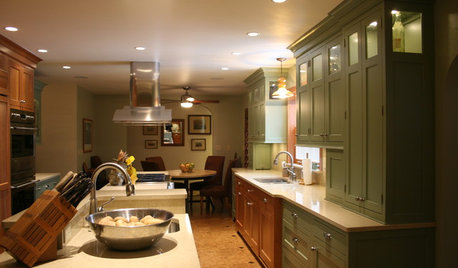Newbie Buyer -- Need Advice about Seller Disclosure Statement
dawiff
14 years ago
Related Stories

MOVINGWhat Those Home-Sale Disclosures Are Really Saying
Avoid costly surprises by knowing what’s included in a home seller’s disclosure, what’s not and what you can do if you suspect foul play
Full Story
KITCHEN DESIGNSmart Investments in Kitchen Cabinetry — a Realtor's Advice
Get expert info on what cabinet features are worth the money, for both you and potential buyers of your home
Full Story
DECORATING GUIDES7 Tips to Sell Your Home Faster to a Younger Buyer
Draw today's home buyers by appealing to their tastes, with these guidelines from an expert decorator
Full Story
SELLING YOUR HOUSE5 Savvy Fixes to Help Your Home Sell
Get the maximum return on your spruce-up dollars by putting your money in the areas buyers care most about
Full Story
SELLING YOUR HOUSEThe Latest Info on Renovating Your Home to Sell
Pro advice about where to put your remodeling dollars for success in selling your home
Full Story
LIFEThe Wisdom of Kenny Rogers, for Declutterers
No need to gamble on paring-down strategies when the country music legend has already dealt out some winning advice
Full Story
DECORATING GUIDESA Beginner's Mini Guide to Buying Antiques
Experience the thrill of the hunt without ignorance ruining the spoils, with this guide to antiquing for novice buyers
Full Story
SELLING YOUR HOUSEHome Staging to Sell: The Latest Techniques That Really Work
Get up to speed on the best ways to appeal to potential buyers through accessories, furniture, colors and more
Full Story
SELLING YOUR HOUSE10 Tricks to Help Your Bathroom Sell Your House
As with the kitchen, the bathroom is always a high priority for home buyers. Here’s how to showcase your bathroom so it looks its best
Full Story
SELLING YOUR HOUSE7 Must-Dos on the Day You Show Your House
Don’t risk losing buyers because of little things you overlook. Check these off your list before you open the front door
Full StoryMore Discussions








C Marlin
mariend
Related Professionals
Ann Arbor Architects & Building Designers · Glens Falls Architects & Building Designers · Holtsville Architects & Building Designers · Banning General Contractors · Cottage Grove General Contractors · Deer Park General Contractors · Green Bay General Contractors · Halfway General Contractors · Millbrae General Contractors · Sun Prairie General Contractors · Tamarac General Contractors · University Heights General Contractors · West Whittier-Los Nietos General Contractors · Avenal General Contractors · Mount Vernon Interior Designers & Decoratorsberniek
creek_side
liz2
dawiffOriginal Author
c9pilot
logic